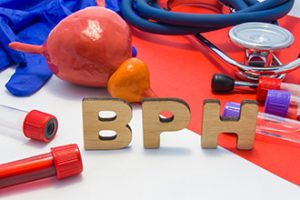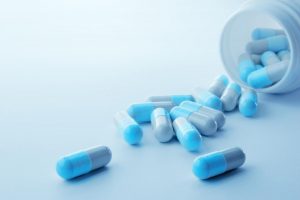Benign Prostatic Enlargement (BPH) is an age-related, non-cancerous growth of the prostate. BPH is a common condition, particularly in older men. In fact, almost every man will suffer from the symptoms of the condition at some point after the age of 40; with more than 70 percent of men over 60 having symptoms of BPH while 90 percent of men over 85 years have the condition. As the prostate gets larger, it presses hard on the urethra causing urethra blockage and bothersome urinary symptoms. However, BPH is not cancer and does not make a man more likely to get prostate cancer.
Phases of prostate growth
Located in front of the rectum and between the penis and the bladder, the prostate is a small, walnut-sized gland that secretes the prostatic fluid, one of the key components of semen. Typically, the prostate goes through two major growth phases during a man’s lifetime. The first growth phase takes place during puberty when the prostate usually doubles in size. Beyond puberty, often at around the age of 25, the prostate begins to grow again and continues to do so for the rest of life in many men. This continuous growth is what leads to BPH and makes the condition quite frequent in older men. BPH does not occur in men until the second phase of prostate growth when the gland begins to press on the urethra and causes urinary problems.
Causes of BPH
As a man gets older, the balance between self-proliferation of cells and cell-death becomes harder to maintain due to changes in hormone levels (androgens), cell-to-cell communication (cell signaling pathways) and growth factors. The cells of the prostate multiply rapidly and form microscopic nodules, which then continue to grow. The abnormal and uncontrolled increase in the number of prostate cells is called hyperplasia. The microscopic nodules increase in mass and volume, resulting in an enlarged prostate. This abnormal growth occurs in the transitional zone around the urethra and is characterized by increase in size without becoming cancerous.
Symptoms of BPH
As the prostate increases in size, it begins to squeeze more tightly on the urethra. This makes it difficult for the bladder to fully compensate for the resulting pressure and reduces its ability to empty completely. Urine flow problems may result, including:
- Difficulty starting urination.
- Dribbling of urine, often after urinating.
- Weak urine stream (peeing in stops and starts).
As the urethra is squeezed by the enlarged prostate, it becomes difficult for the bladder to push out urine. Over time, the bladder muscles are weakened as they push harder to empty urine. This in turn makes it more difficult for the bladder to empty, resulting in:
- Frequency, urinating too often, typically eight or more times per day.
- Incontinence, lack of control over when to pass urine.
- Urgency, sudden need to urinate.
- Nocturia, waking up several times each night to pass urine.
- Urinary retention, a sense that you are not fully emptying your bladder.
- Urine leakage.
In some cases, BPH may lead to backing up and stagnation of urine, which may in turn result in bladder stones, recurring urinary tract infections, bladder divericulae and kidney or bladder damage. The condition also may lead to a sudden inability to pass urine (acute urinary retention), a very painful medical emergency requiring urgent drainage.
When Should You See a Doctor?
Symptoms of BPH vary from person to person. Some men with the condition have few or no issues while others experience severe symptoms. Generally, treatment for BPH may be optional when the symptoms are mild and no complications exist. So if the symptoms do not bother you enough to take medications or go through a procedure for it, then you may only need to speak with your doctor to make sure that your symptoms are stable and your bladder empties well. However, if you experience complications such as a burning sensation when urinating, bladder pain when urinating, blood in urine accompanied by chills and fever or nausea and vomiting, acute urinary retention or lower back pain, then you must seek immediate medical attention.
Treatment for BPH
There are many treatment options for BPH. If you are diagnosed with this condition, talk to your doctor to find out the right treatment for you. The most common treatments include medications (such as alpha reductase inhibitors), UroLift System treatment, thermotherapies (using heat energy such as radiofrequency or microwave), laser resection and transurethral resection. The treatment recommended by your doctor will depend on the severity of your symptoms, the extent to which the symptoms affect your life and the presence of other medical disorders.
Looking for the best urology center for safe and effective treatment? At St Pete Urology, we have built a reputation for exceptional and excellent diagnosis and treatment of BPH and other urological conditions using medical and surgical interventions. Through our skillful and experienced urologists, nurses and technicians, we deliver comprehensive, compassionate and patient-centered treatment and care to all our patients. We use state-of-the-art surgical and medical techniques to deliver timely, safe and effective treatment. For more information on the diagnosis and treatment of BPH and other urological disorders, visit the “St Pete Urology” site.



 When using a prescription for managing enlarged prostate, you will take the pills every day for life, have regular medical checkups, and use special bathroom techniques such as relaxation and double voiding. The medicines will reduce the risk of urinary retention, relieve symptoms and minimize risks of future surgery. However, prescriptions are often expensive and come with certain side effects such as trouble getting an erection, diminished sex drive, tiredness, dizziness, and stuffy nose.
When using a prescription for managing enlarged prostate, you will take the pills every day for life, have regular medical checkups, and use special bathroom techniques such as relaxation and double voiding. The medicines will reduce the risk of urinary retention, relieve symptoms and minimize risks of future surgery. However, prescriptions are often expensive and come with certain side effects such as trouble getting an erection, diminished sex drive, tiredness, dizziness, and stuffy nose.